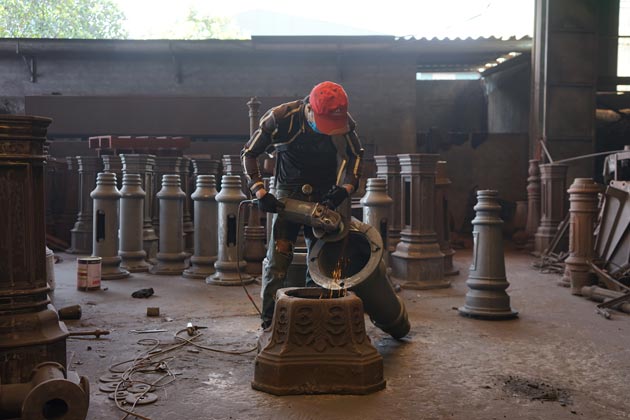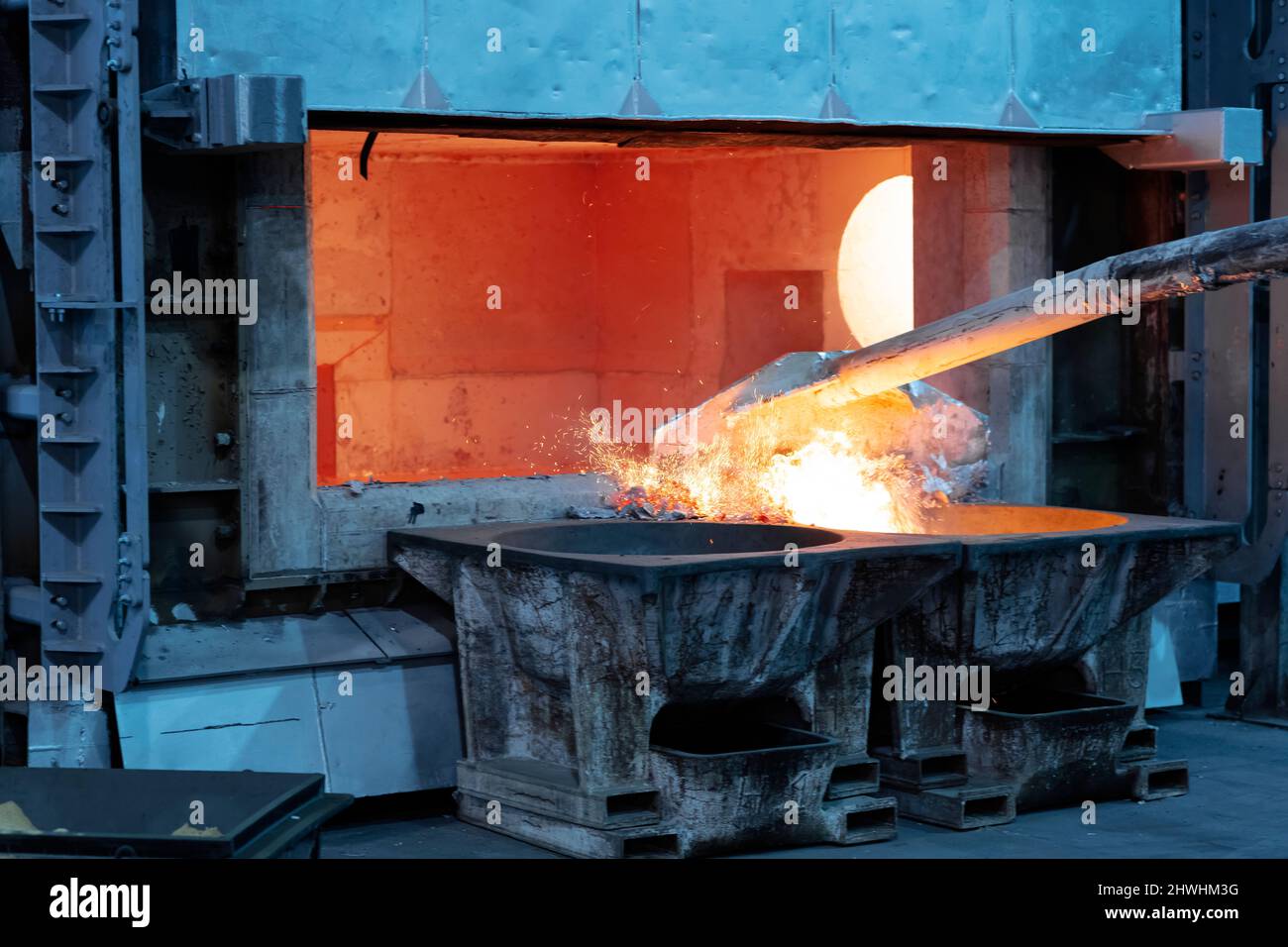Understanding the Conveniences and Innovations in the Aluminum Foundry Industry
The Aluminum Foundry industry plays an important duty in contemporary manufacturing. Its light-weight residential or commercial properties significantly boost fuel effectiveness, especially in aerospace and auto fields. Additionally, Aluminum's resistance to deterioration warranties long life in various applications. As the industry progresses, technologies such as sophisticated recycling and additive manufacturing are improving manufacturing methods. Exploring these improvements reveals not just the benefits yet additionally the challenges in advance for Aluminum factories in a swiftly altering market.
The Lightweight Advantage of Aluminum
Aluminum's lightweight nature offers significant benefits across various sectors, specifically in manufacturing and transport. Its low density permits the manufacturing of parts that are less complicated to set up and take care of, causing decreased labor prices and enhanced performance. In the automobile sector, lighter vehicles add to boosted fuel economic climate and lower discharges, aligning with worldwide sustainability goals. In aerospace, the usage of Aluminum lowers the overall weight of aircraft, which is crucial for boosting efficiency and reducing operational prices.
In addition, Aluminum's light-weight residential or commercial properties facilitate innovative designs that were previously impractical with larger products. This versatility allows producers to produce complex forms and frameworks while maintaining architectural honesty. Overall, the lightweight benefit of Aluminum not just boosts item performance but also drives advancements in technology and design, making it a favored material in various applications.
Rust Resistance and Sturdiness
The Aluminum Foundry industry is renowned for producing products with remarkable corrosion resistance, making them excellent for various applications. This residential or commercial property, combined with improved structural honesty, contributes to the lasting performance advantages that Aluminum parts offer. Because of this, industries increasingly rely on Aluminum to satisfy demanding ecological conditions without compromising top quality.
Superior Corrosion Resistance
While numerous metals face considerable obstacles from ecological factors, Aluminum stands out for its premium corrosion resistance, making it a preferred choice in several applications. This residential or commercial property is mostly as a result of a natural oxide layer that forms on the Aluminum surface, providing a barrier against wetness and destructive representatives. Unlike other metals that might corrosion or weaken gradually, Aluminum preserves its integrity also in extreme atmospheres, such as coastal locations or industrial setups. In addition, its light-weight nature incorporated with corrosion resistance makes it suitable for applications in aerospace, automotive, and marine sectors. Generally, Aluminum's outstanding durability not only boosts item durability yet also decreases upkeep expenses, offering an engaging benefit for consumers and manufacturers alike.
Improved Structural Honesty
Engineers and designers increasingly identify the relevance of enhanced structural integrity in contemporary applications, where both deterioration resistance and resilience are important. Aluminum alloys, understood for their lightweight buildings, additionally display exceptional resistance to corrosion, making them appropriate for harsh atmospheres. The cutting-edge methods used in the Aluminum Foundry industry add substantially to generating elements with boosted sturdiness. Advanced casting procedures and alloy compositions are tailored to meet details efficiency demands, guaranteeing that structures can hold up against extreme conditions without jeopardizing integrity. Moreover, surface treatments and layers improve the life-span of Aluminum products, additionally minimizing damage gradually. This focus on improved architectural integrity not just prolongs the usability of products however additionally decreases maintenance costs, solidifying Aluminum's placement as a material of option in various sectors.
Durable Performance Perks
Resilient efficiency in Aluminum components is largely associated to their exceptional corrosion resistance and sturdiness. Unlike several steels, Aluminum naturally develops a protective oxide layer, which prevents corrosion and degeneration in various atmospheres, consisting of aquatic and industrial setups. This integral residential or commercial property considerably expands the life-span of Aluminum items, reducing maintenance and replacement costs. Furthermore, the lightweight nature of Aluminum boosts its applicability across industries without compromising toughness. The material's resistance to damage additionally adds to its dependability sought after applications, making it a perfect choice for auto, aerospace, and building and construction industries. As sectors significantly prioritize sustainability and longevity, Aluminum's performance advantages line up with modern design needs, strengthening its role in cutting-edge manufacturing procedures.
Environmental Influence and Sustainability
 As the Aluminum Foundry market evolves, it progressively focuses on environmental effect and sustainability, identifying the need for accountable methods despite environment adjustment. Efforts to decrease waste and energy usage go to the center, with numerous shops taking on recycling initiatives to recover Aluminum scrap. This not just lowers raw material usage but additionally notably reduces down energy expense, as recycled Aluminum calls for only a portion of the power contrasted to primary production.
As the Aluminum Foundry market evolves, it progressively focuses on environmental effect and sustainability, identifying the need for accountable methods despite environment adjustment. Efforts to decrease waste and energy usage go to the center, with numerous shops taking on recycling initiatives to recover Aluminum scrap. This not just lowers raw material usage but additionally notably reduces down energy expense, as recycled Aluminum calls for only a portion of the power contrasted to primary production.In addition, advancements in discharges regulate innovations are being carried out to lower air toxins, aligning operations with stricter environmental laws. Foundries are also checking out different power sources, such as solar and wind, to power their facilities sustainably. By promoting partnership with stakeholders, the market aims to develop ingenious services that enhance ecological stewardship. Jointly, these campaigns highlight a commitment to decreasing the view it Aluminum Foundry's carbon footprint while promoting a circular economic situation within the production industry.
Advanced Production Techniques
 Transforming manufacturing procedures, the Aluminum Foundry industry is progressively integrating advanced manufacturing methods to enhance performance and precision. Methods such as computer numerical control (CNC) machining and additive production have become necessary components in maximizing production workflows. CNC machining enables high-precision component manufacture, significantly decreasing product waste and production time. Additive production opens up new opportunities for intricate geometries and lightweight layouts that were previously tough to achieve.
Transforming manufacturing procedures, the Aluminum Foundry industry is progressively integrating advanced manufacturing methods to enhance performance and precision. Methods such as computer numerical control (CNC) machining and additive production have become necessary components in maximizing production workflows. CNC machining enables high-precision component manufacture, significantly decreasing product waste and production time. Additive production opens up new opportunities for intricate geometries and lightweight layouts that were previously tough to achieve.Furthermore, the deployment of automation and robotics in Aluminum factories streamlines operations, lessens human mistake, and boosts employee security. These modern technologies help with an even more responsive manufacturing setting, allowing manufacturers to adapt swiftly to market needs. The assimilation of advanced simulation software program better enhances the design and screening stages, causing superior product top quality. Jointly, these techniques not only improve functional performance yet additionally foster innovation, positioning the Aluminum Foundry market at the center of modern-day production.
Technologies in Recycling Processes
The Aluminum Foundry industry is not just advancing in manufacturing techniques yet is likewise making substantial strides in reusing procedures. Developments are emerging to enhance the efficiency of their explanation reusing techniques, minimizing energy usage and improving sustainability. Advanced arranging modern technologies, such as automatic optical sorting, allow the identification and separation of Aluminum from various other materials with high accuracy. This causes a better of recycled Aluminum, which is necessary for preserving the stability of the end products.
Closed-loop recycling systems are being carried out, allowing manufacturers to recycle Aluminum scrap within their own manufacturing procedures. This lessens waste and promotes a round economic climate. Additionally, research study into brand-new recycling techniques, such as hydrometallurgical processes, supplies the capacity for recovering Aluminum from complicated waste streams. These developments not just add to lowering the carbon footprint of the Aluminum Foundry market yet also reinforce its financial viability in a significantly ecologically aware market.
Applications Across Different Industries
Many industries are progressively identifying the versatility and benefits of Aluminum Foundry products, causing prevalent applications across industries such as automobile, aerospace, building and construction, and consumer goods. In the automobile market, Aluminum spreadings add to lightweight automobile designs, enhancing fuel effectiveness and performance. Aerospace makers use Aluminum elements for their strength-to-weight proportion, crucial for airplane frameworks and elements.
In building and construction, Aluminum is preferred for its durability and resistance to corrosion, making it optimal for home window frames, roof, and architectural supports. Customer products also gain from Aluminum Foundry items, as seen in cookware, electronic devices, and packaging, where light-weight and recyclable products are crucial.
The adaptability of Aluminum Foundry strategies enables precise requirements and complex styles, satisfying the diverse demands of these industries. Because of this, Aluminum Foundry products are becoming integral to contemporary manufacturing processes throughout numerous industries.
Future Fads in Aluminum Foundries
As markets continue to progress, Aluminum foundries are poised to welcome numerous key patterns that assure to boost efficiency and sustainability. One noticeable trend is the increasing adoption of digital technologies, consisting of automation and expert system, which simplify procedures and enhance quality control. On top of that, the push towards sustainable techniques is leading factories to purchase recycling modern technologies, greatly reducing waste and energy usage.
 One more emerging trend is making use of advanced alloys and materials, accommodating the growing need for durable and lightweight elements throughout various sectors (Aluminum Foundry). The assimilation of additive manufacturing strategies is prepared for to reinvent component layout, offering personalization and reducing lead times.
One more emerging trend is making use of advanced alloys and materials, accommodating the growing need for durable and lightweight elements throughout various sectors (Aluminum Foundry). The assimilation of additive manufacturing strategies is prepared for to reinvent component layout, offering personalization and reducing lead times.Cooperation with research institutions is additionally anticipated to drive technology, as factories look for to develop new processes and materials. Aluminum Foundry. Collectively, these patterns suggest a transformative future for the Aluminum Foundry market, lining up with broader objectives of sustainability and efficiency
Frequently Asked Concerns
What Are the Common Prices Connected With Aluminum Foundry Production?
The normal costs connected with Aluminum Foundry manufacturing include raw materials, labor, energy, devices maintenance, and overhead expenditures. These factors collectively affect the general monetary investment required for efficient Aluminum spreading procedures.
How Does Aluminum Compare to Various Other Metals in Toughness?
Aluminum, while lighter than many metals, exhibits remarkable strength-to-weight ratios. Contrasted to steel, Aluminum is less solid however offers outstanding deterioration resistance, making it a favorable option in applications where weight and sturdiness are crucial.
What Precaution Are in Place in Aluminum Foundries?
Precaution in Aluminum foundries typically consist of necessary personal protective equipment, air flow systems to control fumes, normal devices upkeep, training programs for workers, and adherence to rigorous security regulations to lessen threats related to molten steel handling.
How Is Quality Control Managed in Aluminum Casting Processes?
Quality assurance in Aluminum casting procedures involves rigorous click to read more examinations at different phases, including raw product analysis, procedure monitoring, and final item testing. Techniques such as analytical process control and non-destructive testing warranty adherence to industry standards.
What Qualifications Are Very Important for Aluminum Foundry Suppliers?
The relevance of accreditations for Aluminum Foundry providers consists of ISO 9001 for high quality monitoring, ISO 14001 for environmental management, and industry-specific standards like ASTM and SAE, ensuring compliance, security, and dependability in manufacturing processes.
The Aluminum Foundry market plays an important role in modern manufacturing. The Aluminum Foundry market is renowned for creating products with remarkable corrosion resistance, making them optimal for numerous applications. Revolutionizing production procedures, the Aluminum Foundry industry is progressively integrating sophisticated production strategies to boost effectiveness and accuracy. The Aluminum Foundry sector is not only advancing in manufacturing strategies yet is also making significant strides in recycling processes. As markets proceed to advance, Aluminum shops are positioned to embrace numerous vital fads that promise to boost performance and sustainability.